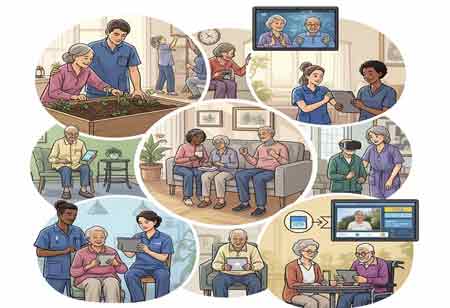Thank you for Subscribing to Eldercare Review Weekly Brief
Dementia Specialists and the Maturation of Home-Based Care
Elder care is evolving to prioritize cognitive health, with dementia specialists playing a crucial role in delivering proactive, holistic support that enhances the quality of life and maintains independence for older adults.

By
Eldercare Review | Thursday, July 31, 2025
Stay ahead of the industry with exclusive feature stories on the top companies, expert insights and the latest news delivered straight to your inbox. Subscribe today.
Elder care is being redefined by a growing focus on cognitive care, reflecting a deeper understanding of aging and the increasing prevalence of mental health conditions that require more than just physical health management. Within this evolving paradigm, dementia specialists are emerging as indispensable figures, fundamentally reshaping the delivery of home health services and becoming a core component of comprehensive elder care models.
Home health care primarily focused on supporting older adults with physical limitations, providing assistance with activities of daily living, medication management, and basic nursing needs. While these aspects remain crucial, the growing recognition of cognitive decline, particularly dementia, as a widespread and complex challenge, has necessitated a paradigm shift. The conventional approach, often fragmented and reactive, is giving way to a more holistic, proactive, and specialized model of care, with cognitive wellness at its heart.
The shift towards cognitive care in home health is a reflection of a greater societal awareness and destigmatization of cognitive conditions. As more individuals and families confront the realities of dementia, the demand for specialized support that allows older adults to age in place, maintaining their dignity and quality of life, has escalated. This desire to remain in familiar surroundings, where comfort and routine can mitigate confusion and distress, underscores the vital role of home-based cognitive care.
The Specialized Expertise of Dementia Care
Dementia specialists, with their in-depth knowledge of cognitive assessment, disease progression, and behavioral management, bring a unique and invaluable expertise to the home health setting. Their understanding extends beyond the medical diagnosis to encompass the nuanced psychological and emotional impact of cognitive decline. They are equipped to develop individualized care plans that cater to the specific stage and manifestations of an individual's cognitive journey. This personalized approach is paramount, as cognitive impairment presents differently in each person, requiring adaptable and flexible strategies.
The integration of dementia specialists into home health models fosters a preventative and proactive approach to cognitive well-being. Rather than waiting for significant decline, these specialists can implement early interventions aimed at maintaining cognitive function for as long as possible. This includes developing routines that promote mental stimulation, encouraging engagement in meaningful activities, and fostering environments that minimize disorientation and maximize independence. They are adept at recognizing subtle changes in cognitive status and adapting care strategies accordingly, ensuring that support evolves in line with the individual's changing needs. Their specialized training enables them to identify triggers for agitation or confusion and implement strategies to soothe and redirect, fostering a more peaceful and supportive atmosphere within the home. This proactive stance significantly contributes to preserving the individual's cognitive abilities and overall well-being for an extended period.
Enhancing Home Environments for Cognitive Wellness
Dementia specialists also play a crucial role in developing and implementing effective communication and interaction strategies within the home environment. They train caregivers and family members in effective communication techniques that take into account cognitive changes, thereby fostering understanding and reducing frustration. This guidance is vital in navigating the complexities of altered perception, memory loss, and communication difficulties often associated with cognitive decline. By empowering those closest to the individual with the right tools and knowledge, specialists contribute significantly to a more harmonious and supportive living experience. They guide families on how to simplify language, use visual cues, and maintain a calm demeanor, all of which are crucial for effective interaction with individuals experiencing cognitive impairment.
The scope of a dementia specialist in home health extends beyond direct patient interaction. They play a pivotal role in creating a supportive ecosystem around the individual. This includes guiding families on how to modify the home environment to enhance safety and ease of navigation, recommending assistive technologies, and educating about the importance of consistent routines. Their expertise helps to create a structured yet flexible framework that promotes comfort and reduces anxiety for individuals living with cognitive impairment. This can involve impactful yet straightforward adjustments such as decluttering pathways, enhancing lighting, or labeling drawers and doors to aid memory. The objective is to create an environment that is not only safe but also predictable and comforting, minimizing confusion and maximizing the individual's ability to navigate their surroundings independently.
The Future Trajectory of Integrated Home Health
The future of elder care in the home is undeniably intertwined with the expansion of cognitive care and the central role of dementia specialists. As demographic trends indicate a continued increase in the aging population and, consequently, in the prevalence of mental conditions, the demand for highly skilled professionals who can navigate these complexities within a home setting will only intensify. This shift represents a maturation of home health models, moving towards a truly person-centered approach that acknowledges the profound interplay between physical and cognitive well-being.
The integration of dementia specialists into home health signifies a strategic evolution, recognizing that comprehensive care for older adults must encompass their cognitive needs with the same rigor as their physical requirements. This integrated approach ensures that individuals can remain in their preferred environment, receiving tailored support that promotes their overall well-being. The emphasis is on enabling older adults to live as fully and independently as possible within their cherished homes, supported by dedicated professionals who understand the intricate nuances of the aging mind. This evolution signifies a fundamental commitment to enriching the lives of older adults, empowering them to experience greater comfort, dignity, and a continued sense of self, even in the face of cognitive changes. The continuing development of educational programs and training pathways for dementia specialists will be crucial in meeting this growing demand and ensuring that home health agencies are equipped to provide the highest standard of cognitive care, further solidifying the core position of these specialists in modern elder care models.






